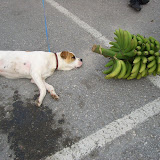Monday was the written exam, which will account for 15% of our marks for the intermediate term. We won't find out how we did for another couple of weeks, but I'm pretty confident that I'll hit the pass mark. Most of questions were fairly easy, in that you could anticipate and prepare for the sorts of things they would ask on the major methods, recipes, and ratios. But the examiners definitely lobbed in a few googlies. Like a big section on game, which we only covered in the previous term. And some pretty detailed wine questions on New World wines, which I don't know as well as France, Spain and Italy.
But that was the side show. The main event came Tuesday. The practical exam, a.k.a. the Big, Scary One. You can imagine the atmosphere. You're trying to achieve maximum efficiency, speed and skill while under the examiners' gaze, as they silently watch you cook an ambitious menu in four and a half hours, scribbling down notes on their papers. In an ideal world, of course, you'd be the epitome of non-stop concentration, have effortless speed, and would cook each dish to utter perfection. Or even to the standard to which you usually cooked during class. But the pressure of the clock is there, and it's easy to do stupid things you wouldn't normally do, or to panic when you get behind your timeplan.
On the day of the exam, we all arrived at the school in time to be dressed and in the dem room at 8.30am, with our timeplans and knife rolls. At 8.45, we were taken up to the kitchens, and given half an hour to weigh up ingredients. A good amount of time, but certainly not long enough to get everything weighed up. Then at 9:15, we started to cook. We were to serve 2 cheese souffles each at 12.45pm (with 5 minutes leeway either side). Then at 1.15pm we were to serve the rest of the dishes, namely:
- A pan fried sirloin steak served medium rare
- bearnaise sauce
- potatoes of our choice, to complement the steak
- turned carrots
- coffee bavarois
- pate frollee biscuits (almond pastry)
- chelsea buns with apricot glaze
In my case, the problem wasn't doing anything particularly stupid. I just wasn't as efficient as I should have been, and was playing catch up for most of the day. I had a nice, soft dough for the Chelsea buns, but the softness of the dough meant that mine took a bit longer to knead than others', and so I was 15 minutes behind my timeplan from about 10am onwards. I almost forgot my biscuits while trying to multi-task (making apricot glaze, sauteing potatoes and checking chelsea buns simultaneously). Fortunately, I managed to save them just before they went too dark.
Then I had to crank to get my souffles out at 12.45, overcoming a mild panic when my souffle base was really lumpy. (Managed to save it by whisking out the lumps aggressively with a sauce whisk.) But by that time I was a bit mentally exhausted, and was making stupid mistakes. Like not allowing enough time for my steak and my carrots. When the examiner said we could call for second service, my steak was still rare and my carrots were well undercooked. But somehow I managed to get everything plated up, and so scraped though by the skin of my teeth. I've no idea what my mark was, but one of the junior examiners took pity on us and told those of us who'd passed. Fortunately for me, I wasn't the only one who had problems. No one in kitchens 2 or 3 served on time, so I suspect there were a few underdone steaks. And at least 2 people failed (out of a total of 15), and will be offered retakes.
Thankfully it's all over now, and I can concentrate a few fun cooking escapades ahead. To whit. Making an empanada for the class party on Friday. And helping cook for a group of friends at a country house weekend over Easter, when we will be celebrating several birthdays.
I'll keep you all posted of any highlights over the break.

